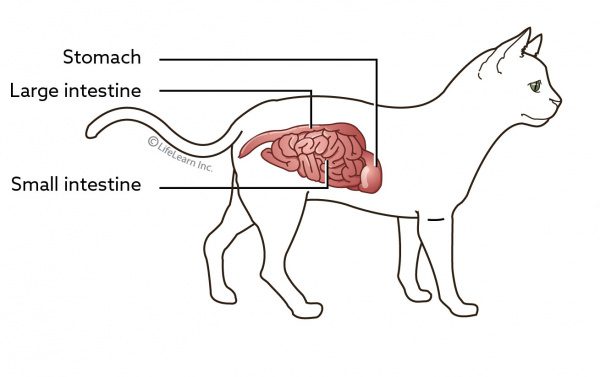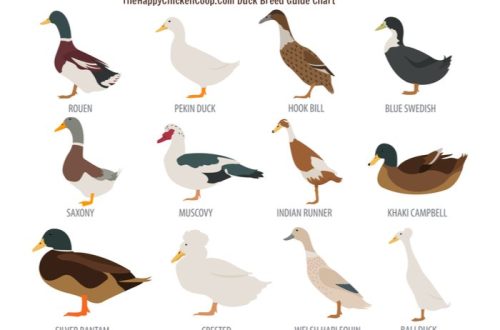
Enteritis in a cat: types of disease, how to recognize and treat it
Enteritis in cats is a serious disease during which the intestinal epithelium becomes inflamed. In most cases, kittens are affected by this disease. Therefore, to prevent enteritis, owners need to take time to take hygiene measures and vaccinate small cats at the right time. In some cases, enteritis also affects adult cats, especially those who have this chronic disease, are prone to stress, are kept in poor conditions, and receive poor-quality nutrition. If you do not treat enteritis in cats on time, then in the future its treatment will be quite complicated, long and does not guarantee a complete recovery, even if you turn to an experienced professional.
Enteritis viruses
Those viruses that cause enteritis in cats are very dangerous. They easily go from a sick cat to a healthy one and survive well in the environment. These viruses can be in the cat’s body for a long time and not show themselves, or they can appear immediately after infection with a bunch of symptoms. If the animal has good immunity, then enteritis can go almost unnoticed by the owner, while there may be:
- one-time vomiting;
- several times diarrhea;
- slight malaise.
Enteritis in cats in this case passes quickly. However, if an animal is a carrier of the virus for too long, possible to infect others: for several months, a cat excretes a virus with feces, which enters the external environment and feels great there. This is dangerous for other animals that are nearby, as the risk of infection increases.
Types of disease
There are several types of disease:
- coronovirus;
- parvovirus;
- rotavirus.
The symptoms of enteritis caused by these viruses are very similar to each other. Based on this, a cat cannot be treated on its own, because it is only possible to determine the type of virus in a laboratory.
Coronovirus enteritis manifests itself in the defeat of the upper layer of the epithelium, which lines the small intestine from the inside. Infected the cat is constantly worried, does not eat food, there is a bad reaction to the owner. The animal has a tight, distended abdomen. She does not let them touch her, she runs away and hisses. Accompanying symptoms of coronovirus are constant vomiting with diarrhea. The stool is viscous, liquid with a bright orange-red coloring. The temperature is normal or slightly elevated.
Parvovirus enteritis in cats is a very serious and dangerous disease. If the disease is not treated, then in 90% of situations the animal dies. The disease can take various forms:
- nervous;
- pulmonary;
- intestinal.
Symptoms of the disease are expressed by fever, vomiting and diarrhea, nervous twitching, coughing, weakness, refusal to eat.
Rotavirus enteritis in cats occurs spontaneously. The animal constantly screams, rushes around the room, bends strangely, does not eat, does not allow touching the stomach. There is fever, liquid, mucous, severe diarrhea, in some cases with bloody discharge, frequent vomiting. If enteritis is not treated, then the animal develops weakness, dehydration, a powerful fever, and the general condition becomes sharply negative. Rotavirus enteritis can be curedif you see a doctor in time. Weakened cats, of course, can die if they are not given timely veterinary care.
Disease treatment methods
Enteritis will cease to be a terrible disease with a fatal outcome if it is treated on time. In such cases, the disease passes successfully. The veterinarian will develop a specially for your cat prescription with appropriate drugsthat are aimed at eliminating a specific type of virus. He will also advise which antibiotics, antipyretics, painkillers, antispasmodics, immunocorrectors, antiemetics and fixing drugs should be used.
During treatment, the animal must be kept warm, fed in modest portions, warm food, which is quickly absorbed. If a cat is affected by coronavirus enteritis, then dehydration often occurs in her body. In this case, a qualified specialist will recommend a drug that restores the water-salt balance.
If you follow the correct treatment and provide the cat with good care, after about a few days you will notice a positive result, the general condition of the patient will improve. However, the course of treatment prescribed by the veterinarian must be completed.
Regardless of the type of virus, removal of symptoms is an important step complex treatment. Based on this, owners should remember well such nuances:
- how the disease began;
- how often does vomiting and stool occur;
- what color, volume and consistency of feces and vomit;
- what changes in behavior are observed;
- whether the animal refuses to eat;
- photophobia or not.
These details will help the doctor in a short time to determine the diagnosis and make the most effective treatment.
When the recovery stage comes, you need to pay a lot of attention to caring for the animal: remove traces of vomiting and feces from bedding and wool, do not make noise, do not create drafts, do not leave the cat alone for a long time.





